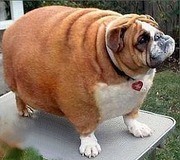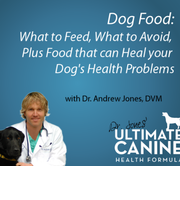|
|
Hello Friend,
A happy Friday to you- whether you are at work, or frantically trying to get a black Friday deal..
A am guessing you have been exposed to TONNES of specials, so I want to give you something complimentary :-)
I have a new upcoming webinar:
Dog Food: What to Feed, What to Avoid, Plus Food that can Heal your
Dog's Health Problems
Join me in this LIVE 90 Minute FREE Online Seminar
Date: Thursday, December 5th, 2013
Time: 6:00pm Pacific (8:00pm Central, 9:00pm Eastern)
-----> http://www.thedogsupplement.com/webinar/
|
|
|
|
Lumpy Pet? When to see your vet, and here's what you can do at home
|
|
 |
Most lumps are easy to feel. They may show up on the chest or along the back. Most lumps on dogs and cats are benign, while a small number of lumps that appear on are cancerous. The most common ones on dogs are lipomas (benign fatty tumors), wart like growths ( papillomas), and sebaceous cysts.
Here are the indicators of deciding whether or not a growth is serious: firm, not moveable, fast growing, and whether it opens and bleeds. These are more serious signs of cancer, and warrant a veterinary visit. Benign growths such as lipomas on the other hand are typically soft, moveable, slow growing, and never rupture through the surface of the skin.
The first thing you want to do is examine the mass, and assess the severity of the lump. Lumps that are regularly shaped are less likely to be serious. Lumps that move easy under the skin are usually benign, such as fatty tumors (lipomas). Lumps that grow slowly are likely benign. Lumps that discharge a cheesy material are usually sebaceous cysts and can be left alone.
A simple thing to do to determine if a mass is serious is to visit your veterinarian and have him or her perform a needle aspirate and cytology of the lump. A microscopic slide can often tell if it is serious or not.
A ruptured cyst needs to be kept clean so it will heal and not become infected. Wash it twice daily with an antiseptic solution (such as chlorhexidine or iodine). Trim the hair around the cyst to aid in cleaning. You can also use holistic antiseptic solutions such as concentrated black tea, wiping the area three times daily.
Healing compresses are especially helpful for cysts and papillomas. A cyst that is enlarged but won't rupture can be decreased in size by applying a warm cloth directly to the area daily. Ensure that the cloth is hot to your skin ( but not too hot), then let it cool on your dog's growth. Another option is to use a bean bag compress; heat the beans in a microwave, test it on your skin, and apply.
Stimulate your pets skin immune system with key nutrients: vitamin E and essential fatty acids are great for boosting your pet's skin immune function: give 100 IU per 10 lbs of body weight daily of Vitamin E. For dogs use ground flax as the essential fatty acid source, giving 1 teaspoon per cup of dog food. For cats I prefer the use of fish oil.
There are 2 anti-inflammatory type herbs that I have found especially helpful for ruptured cysts and papillomas: Aloe and Calendula. These can be purchased in a cream form, or Aloe from a plant can be applied directly to the affected area.
Some pet owners have found homeopathic remedies for be helpful for many growths. Thuja is. the first homeopathic remedy that many homeopaths advise for any type of canine growth. The dose is 30C given once-twice daily for at least 30 days. Causticum is used for warts that tend to bleed. Give 30C once-twice daily for at least 30 days.
|
|
Veterinary Secrets Pet of the Day!
|
|
Jenny...
Here is a picture of my JENNY a Westie.
|
| |
|
| Dog and Cat Words of Wisdom...
“Women and cats will do as they please, and men and dogs should relax and get used to the idea.”
― Robert A. Heinlein
|
| Heal Your Pet At Home!
Best Wishes,
Dr Andrew Jones, DVM |
|  |
P.S. On the webinar I am going to answer as many of your dog food questions as possible- some of what you'll learn:
What are the best brands of food to feed my dog?... Find out on the webinar.
Is it OK to keep changing my dog's food, or should I stay on the same diet all the time?... Get the answers here
My dog constantly licks her paws, scratches her skin, and has been diagnosed with a food allergy... Here's is what you need to know.
What diet (raw, home cooked from a vet recipe, natural grain free kibble/canned) is best for longevity in dogs?... Get longevity diets on the webinar.
Picky eater?... How to get your dog to eat his food with these ingredients.
Homemade diets... These are the supplements that you need to put in homemade dog food
Overweight dog? Some diets help, and some don't. Here's what you should be feeding..
Recipes that heal. At home diet recipes for maintenance and disease prevention.
Is Grain Free really as important as everyone is making it out to be? The answers are here...
Dog with recurring ear infections? There are many options, but the foundation is diet - this is what you need to be adding.
Do you have a dog with chronic eye tearing? Little known nutrients which can finally stop this unwanted condition...
The webinar signup is here:
-----> http://www.thedogsupplement.com/webinar
|
| DISCLAIMER: This information is for educational purposes only and is not intended to replace the advice of your own veterinarian. Dr Andrew Jones resigned from the College of Veterinarians of B.C. effective December 1 2010, meaning he cannot answer specific questions about your pet's medical issues or make specific medical recommendations for your pet.
PRIVACY POLICY: We will never rent, sell, loan, provide, barter, exchange or in any way make available your personal information to others. You can unsubscribe or change your email address at any time using the links at the bottom of this email.
Copyright 2013 Four Paws Online Ltd.
Tel: 1-800-396-1534
Fax: 1-888-398-1378
www.theonlinevet.com
support@fourpawsonlineltd.com
|
|
|
|
|